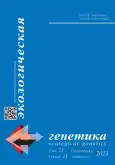A set of Saccharomyces cerevisiae strains possessing [PSI+] prion formed by Sup35 protein with various deletions in prionogenic domain
- Authors: Kulichikhin K.Y.1, Sopova J.V.1, Rubel A.A.1
-
Affiliations:
- Saint Petersburg State University
- Issue: Vol 21 (2023): Спецвыпуск
- Pages: 16-16
- Section: Genetically modified organism. The Нistory, Achivements, Social and Environmental Riscs
- Submitted: 29.07.2023
- Accepted: 06.09.2023
- Published: 04.12.2023
- URL: https://journals.eco-vector.com/ecolgenet/article/view/567848
- DOI: https://doi.org/10.17816/ecogen567848
- ID: 567848
Cite item
Full Text
Abstract
Amyloid aggregation is a key factor for the development of a series of lethal and incurable diseases, commonly named amyloidoses. The development of various pathologies might be caused by the aggregation of the same protein. This can be due to the ability of any particular protein to adopt several amyloid conformations, specific for the exact disease (Pick’s and Alzheimer’s disease-specific forms of tau protein). How the specific amyloid conformation is formed in each case is not fully understood.
In yeast, translation termination factor Sup35 is one of the most extensively studied amyloidogenic proteins. Sup35 aggregation (induction of [PSI+] prion) inactivates the protein and leads to the suppression of nonsense-mutation as the result of read-through.
Prionogenic domain of Sup35 protein (Sup35N) has several specific regions: N-terminal QN-rich region (QN), oligopeptide repeats (NR) and C-terminal region (CTN). Sup35 can form various strains of [PSI+] with predominant involvement of different regions of Sup35N into amyloid core thus mimicking disease-specific strains of amyloids described for human amyloidogenic proteins.
We implemented the deletions of fragments encoding 1-39 a.a. (QN region) or 75-123/98-123 a.a. (CTN region) into SUP35 gene of yeast Saccharomyces cerevisiae. Then, we induced aggregation of Sup35 protein in the strains carrying mutated SUP35 gene and got the strains possessing [PSIΔ39+], [PSIΔ75–123+], or [PSIΔ98–123+] prion. A set of strains possessing [PSI+] formed by Sup35 protein with various deletions in Sup35N may be convenient model to study disease-specific strains of amyloids formed by human proteins.
This research was funded by Russian Science Foundation (grant 20-14-00148-П) and by the St. Petersburg State University (project 94031363).
Keywords
Full Text
Amyloid aggregation is a key factor for the development of a series of lethal and incurable diseases, commonly named amyloidoses. The development of various pathologies might be caused by the aggregation of the same protein. This can be due to the ability of any particular protein to adopt several amyloid conformations, specific for the exact disease (Pick’s and Alzheimer’s disease-specific forms of tau protein). How the specific amyloid conformation is formed in each case is not fully understood.
In yeast, translation termination factor Sup35 is one of the most extensively studied amyloidogenic proteins. Sup35 aggregation (induction of [PSI+] prion) inactivates the protein and leads to the suppression of nonsense-mutation as the result of read-through.
Prionogenic domain of Sup35 protein (Sup35N) has several specific regions: N-terminal QN-rich region (QN), oligopeptide repeats (NR) and C-terminal region (CTN). Sup35 can form various strains of [PSI+] with predominant involvement of different regions of Sup35N into amyloid core thus mimicking disease-specific strains of amyloids described for human amyloidogenic proteins.
We implemented the deletions of fragments encoding 1-39 a.a. (QN region) or 75-123/98-123 a.a. (CTN region) into SUP35 gene of yeast Saccharomyces cerevisiae. Then, we induced aggregation of Sup35 protein in the strains carrying mutated SUP35 gene and got the strains possessing [PSIΔ39+], [PSIΔ75–123+], or [PSIΔ98–123+] prion. A set of strains possessing [PSI+] formed by Sup35 protein with various deletions in Sup35N may be convenient model to study disease-specific strains of amyloids formed by human proteins.
This research was funded by Russian Science Foundation (grant 20-14-00148-П) and by the St. Petersburg State University (project 94031363).
About the authors
Konstantin Yu. Kulichikhin
Saint Petersburg State University
Email: konstantin_kulichikhin@yahoo.com
ORCID iD: 0000-0002-7443-4560
cand. sci (biol.), senior researcher, scientific laboratory of amyloid biology
Russian Federation, Saint PetersburgJulia V. Sopova
Saint Petersburg State University
Email: sopova@hotmail.com
ORCID iD: 0000-0002-7825-273X
cand. sci (biol.), leading scientist, center for transgenesis and genome editing
Russian Federation, Saint PetersburgAleksandr A. Rubel
Saint Petersburg State University
Author for correspondence.
Email: arubel@mail.ru
ORCID iD: 0000-0001-6203-2006
dr. sci. (biol.), head, scientific laboratory of amyloid biology
Russian Federation, Saint PetersburgReferences
Supplementary files










